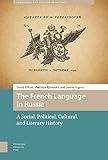The French Language in Russia : A Social, Political, Cultural, and Literary History / Derek Offord, Gesine Argent, Vladislav Rjéoutski.
Material type: TextSeries: Languages and culture in history ; 8Publisher: Amsterdam : Amsterdam University Press, [2018]Copyright date: ©2018Description: 1 online resource (702 p.) : 15 halftonesContent type:
TextSeries: Languages and culture in history ; 8Publisher: Amsterdam : Amsterdam University Press, [2018]Copyright date: ©2018Description: 1 online resource (702 p.) : 15 halftonesContent type: - 9789048532766
- Bilingualism -- Russia
- French language -- History -- 18th century -- Russia
- French language -- History -- 19th century -- Russia
- AUP Wetenschappelijk
- Amsterdam University Press
- Language and Literature
- Linguistics
- FOREIGN LANGUAGE STUDY / French
- French
- Romanticism
- Russia and the West
- Russian
- bilingualism and diglossia
- history of nobilities
- language debate
- nationalism
- plurilingualism and multilingualism
- social history of language
- the Enlightenment
- 447.947
- online - DeGruyter
| Item type | Current library | Call number | URL | Status | Notes | Barcode | |
|---|---|---|---|---|---|---|---|
 eBook
eBook
|
Biblioteca "Angelicum" Pont. Univ. S.Tommaso d'Aquino Nuvola online | online - DeGruyter (Browse shelf(Opens below)) | Online access | Not for loan (Accesso limitato) | Accesso per gli utenti autorizzati / Access for authorized users | (dgr)9789048532766 |
Browsing Biblioteca "Angelicum" Pont. Univ. S.Tommaso d'Aquino shelves, Shelving location: Nuvola online Close shelf browser (Hides shelf browser)

|

|

|

|

|

|

|
||
| online - DeGruyter Construction as Depicted in Western Art : From Antiquity to the Photograph / | online - DeGruyter Theme Park Fandom : Spatial Transmedia, Materiality and Participatory Cultures / | online - DeGruyter Contacts and Networks in the Baltic Sea Region : Austmarr as a northern mare nostrum, ca. 500-1500 AD / | online - DeGruyter The French Language in Russia : A Social, Political, Cultural, and Literary History / | online - DeGruyter The State, Ulama and Islam in Malaysia and Indonesia / | online - DeGruyter Utopia 1516-2016 : More's Eccentric Essay and its Activist Aftermath / | online - DeGruyter Creating Distinctions in Dutch Genre Painting : Repetition and Invention / |
Frontmatter -- Contents -- List of illustrations -- Preface -- Acknowledgements -- Presentation of dates, transliteration, and other editorial practices -- Abbreviations used in the notes -- The Romanovs -- Introduction -- Chapter 1: The historical contexts of Russian francophonie -- Chapter 2: Teaching and learning French -- Chapter 3: French at court -- Chapter 4: French in high society -- Chapter 5: French in diplomacy and other official domains -- Chapter 6: Writing French -- Chapter 7: French for cultural propaganda and political polemics -- Chapter 8: Language attitudes -- Chapter 9: Perceptions of bilingualism in the classical Russian novel -- Conclusion -- Bibliography -- Index
restricted access online access with authorization star
http://purl.org/coar/access_right/c_16ec
-- With support from the Arts and Humanities Research Council of the UK and the Deutsches Historisches Institut Moskau -- The French Language in Russia provides the fullest examination and discussion to date of the adoption of the French language by the elites of imperial Russia during the eighteenth and nineteenth centuries. It is interdisciplinary, approaching its subject from the angles of various kinds of history and historical sociolinguistics. Beyond its bearing on some of the grand narratives of Russian thought and literature, this book may afford more general insight into the social, political, cultural, and literary implications and effects of bilingualism in a speech community over a long period. It should also enlarge understanding of francophonie as a pan-European phenomenon. On the broadest plane, it has significance in an age of unprecedented global connectivity, for it invites us to look beyond the experience of a single nation and the social groups and individuals within it in order to discover how languages and the cultures and narratives associated with them have been shared across national boundaries.
Mode of access: Internet via World Wide Web.
In English.
Description based on online resource; title from PDF title page (publisher's Web site, viewed 25. Jun 2024)


